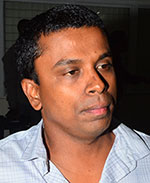THE premise on which President Donald Ramotar moved on Monday to prorogue the first session of the 10th Parliament -– dialogue instead of confrontation -– is one that has merit, according to several representatives of the private sector and civil society, who spoke to the Guyana Chronicle yesterday.
Close to 20 of these representatives engaged the Head of State and high-level functionaries of the Central Government yesterday at a meeting held at the Office of the President in Shiv Chanderpal Drive in Georgetown.
Chairman of the Private Sector Commission (PSC), Mr. Ramesh Persaud, told this newspaper that the move to have greater dialogue is one that is widely supported. “The President explained to us that his decision was to allow for dialogue. We endorse the position that there should be dialogue, and we hope that a solution can come very soon,” he said.
The PSC itself has commented on the recent political development, and in a statement released on Monday night, had this to say: “The Private Sector Commission is concerned and disappointed that the continued absence of political compromise between our Government and the Opposition has led to this abnormal situation. It is obviously not a situation conducive to a stable business environment or encouraging to business investment. We can only hope that good sense will prevail and that the national interests predominate over potentially destructive narrow political intent.”
President of the Federation of Independent Trade Unions of Guyana (FITUG), Mr. Carville Duncan, made it clear that dialogue has to start at the earliest possible opportunity.
“The meeting is a good gesture by the President, because having civil society informed on the rationale behind his decision is a good move. The next step is with civil society. We need to get together and see how best we can talk to the Opposition and get the dialogue process started,” he said.
Businessman, Mr. Terry Singh suggested that a public debate by the representatives of the political parties and stakeholders from the private sector and civil society could be one way to begin addressing the impasse. According to him, private sector and civil society representatives could act as mediators in assisting local politicians to chart the best course forward for Guyana under the current circumstances.
“What they need to do is sit down and resolve the problems… What they need to do is come in a public domain where you have stakeholders, and let the ruling party and the opposition explain their positions, and let them work their differences out between civil society and the private sector. This country has grown from something to something more than extraordinary…. We don’t want anything to fail,” Singh said.
Guyana Trades Union Congress (GTUC) General Secretary, Mr. Lincoln Lewis contends that Parliament should not have been prorogued, but at the same time, he has made it clear that politicians represented in the National Assembly were sent there to work on behalf of the people. As such, he stressed, the current challenges must be resolved soonest.
Mr. Chris Fernandes, Chief Executive Officer (CEO) and Chairman of John Fernandes Limited (JFL), told the Guyana Chronicle that meaningful dialogue is the one sure way to move this country forward.
He said, “We have to try and bring the parties together. As a country, we have to find a solution. Regardless of how we got where we are, we have to find a way to get past this, and the only way we can do that is by dialogue.”
Mrs. Annette Arjoon-Martins, Air Services Limited (ASL) Operations Manager, highlighted that Guyanese are concerned about the current state of affairs that obtains in the country, and she stressed that a resolution is being sought from Guyana’s political leaders. “The meeting with the President was a good initiative. It didn’t tell us anything new, other than what has happened in the past day and a half; but we are optimistic that our politicians will put Guyana first and, through dialogue, come up with a solution to move Guyana forward,” she said.
The President’s decision to prorogue Parliament followed an address to the nation made on November 4, 2014, in which he stated that it was his desire for the National Assembly, in its post-recess sittings, to deliberate and give priority to important matters relating to the development of the country and the future of all Guyanese. Unfortunately, the combined Opposition parties, A Partnership for National Unity (APNU) and the Alliance For Change (AFC), have indicated their intention to push ahead with the AFC-sponsored no-confidence motion, which would have triggered a dissolution of the 10th Parliament and make way for fresh general elections.
As such, the President, in keeping with his November 4 commitment, moved to prorogue the National Assembly to pave the way for greater dialogue, in the interest of the Guyanese people.
The principal effect of ending a session of Parliament by prorogation is that business gets terminated and Members are released from their parliamentary duties until Parliament is next summoned. All unfinished business on the Order Paper is dropped from the National Assembly’s agenda or is considered ‘dead’, and all committees lose their power to transact business, thus providing a fresh start for the next session.
No committee can sit during a prorogation. Bills which have not received presidential assent before prorogation are “entirely terminated” and, in order to be proceeded with in the new session, must be reintroduced as if they had never existed.
The presidential right to prorogue Parliament is one that is common in the constitutions of commonwealth countries, making it a tool Governments commonly resort to. However, this is the first time that the Guyana Parliament has been prorogued, and the situation owes its existence to the circumstances that currently obtain in Guyana.





